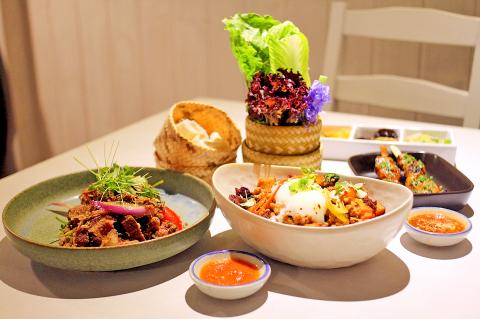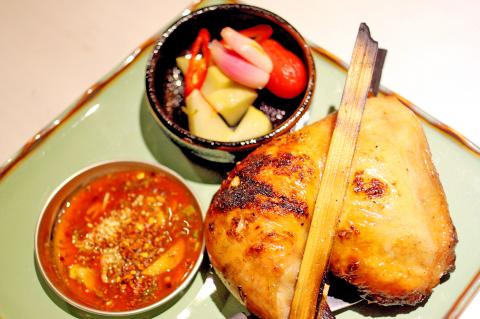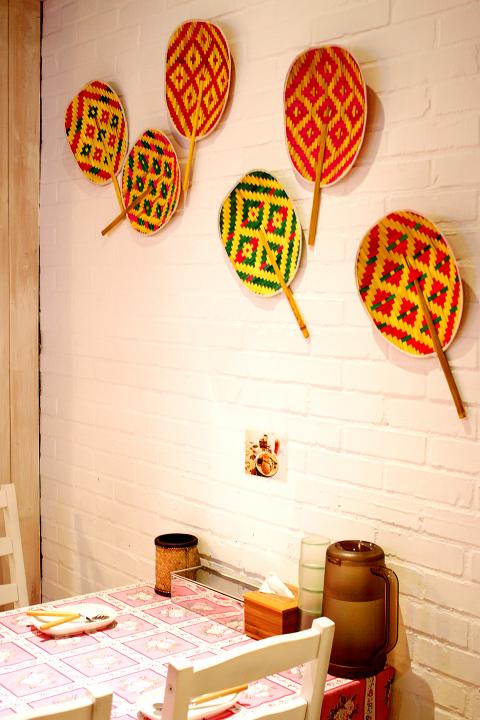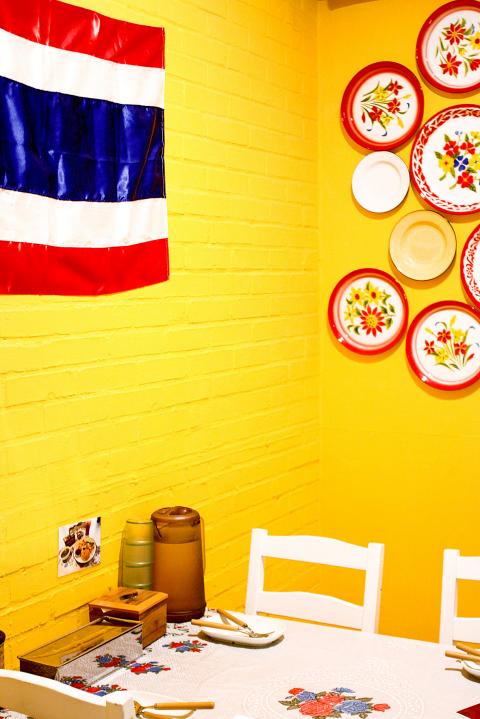Calvin Wang (汪義諠) has worked in some of Taipei’s best fine-dining kitchens, from French institution Joel Robuchon to the avant-garde Gen Creative. But for his first independent venture, the young chef, a self-described “third culture kid,” looked back to the comforts of his childhood in Bangkok.
Kao Jai Thai Bistro, his brainchild, opened this summer a couple of paces away from Breeze Center, adding to the many mid-market dining options in the area. Tables at the casual dining space span two floors, with an additional bar on the ground level and spacious private room in the basement.
The interior is lovingly decorated with artifacts hauled back from Thailand, from ornate PVC tablecloths to flowery enamelware, bamboo baskets and a portrait of the late Thai king. The decor may be homey and familiar, but the food is decidedly not.

Photo: Davina Tham, Taipei Times
You won’t find tom yum, green curry or pad Thai here. It’s obvious that Kao Jai isn’t interested in satisfying these tried-and-tested takeout cravings, which are all that some ever sample of Thai food. Instead, the menu distills chef Calvin’s experiments with new flavor and texture combinations that push at the boundaries of the Thai culinary realm.
Take the duck larb (NT$450) for example. Larb, a meat salad with fresh herbs, is commonly eaten in the Isan region of Thailand, bordering Laos, where it’s considered a national dish. Here, fresh mint, a kicker tamarind dressing and sweet-sour cherry tomatoes add layers of flavor that are discernibly Thai. But when the usual ground meat is swapped out for succulent chunks of duck, served slightly warm, that tips the dish over into newer territory.
If you eat pork offal, the nam tok (NT$420), or pork neck with pig’s liver and ears, will be irresistible. Perennial favorite som tam, or papaya salad, is also available, with betel nut leaves and salted egg (NT$250). But the emphasis is undoubtedly on grills and wok stir-fries.

Photo: Davina Tham, Taipei Times
Moo ping pork (NT$180) on skewers is well-executed, but pales in comparison to the superlative grilled chicken (NT$340). A whole thigh with charred skin and appetizingly pink, juicy meat is served with nam jim jaew, a spicy-sour dipping sauce.
Kao Jai puts a lot of thought into such accents. Every table gets a trio of pickles — guava, black fungus and radish, when I visited — as well as a bouquet of salad leaves and a fist-sized round of sticky rice to supplement the dishes with acidity and crunch, or mellow them out as needed.
Aside from the nam jim jaew, a Thai lime pesto and caramelized pineapple sauce can also go with other grills, like the beef tongue (NT$480) and chicken satay (NT$180). The fermented chili deepens heat and umami in just about anything you add it to.

Photo: Davina Tham, Taipei Times
A note about spice levels: the kitchen keeps the heat mild by default, to suit local palates, so tell the waitstaff if you don’t want them to hold back. I didn’t get the message across in time for my stir-fried ground pork with holy basil (NT$260), dialed up a notch by the addition of deeply caramelized sweet potatoes and a soft-boiled egg, and felt that it could do with more salt and heat.
I was also expecting punchier and aromatic notes in the Thai fried rice (NT$160), but the flavors here were muddled. The addition of a soft-boiled egg also seemed a bit overzealous, especially since it made the rice grains soggy.
Thai beer (NT$100) is the ideal accompaniment to this meal. The full menu is only available at night, but if you find yourself in the area on a weekday afternoon, Kao Jai also serves a business set of chicken rice (NT$220) with seasonal vegetables, pickles, egg and an iced Thai milk tea. It’s tender, healthful and filling.

Photo: Davina Tham, Taipei Times
Kao Jai hasn’t perfected its execution yet, but the newfangled dishes I’ve tried so far keep me hopeful that chef Calvin keeps thinking outside the box. Given the popularity of Southeast Asian cuisines here, it’s about time that one-of-a-kind Thai cooking found its way to Taipei.

Beijing’s ironic, abusive tantrums aimed at Japan since Japanese Prime Minister Sanae Takaichi publicly stated that a Taiwan contingency would be an existential crisis for Japan, have revealed for all the world to see that the People’s Republic of China (PRC) lusts after Okinawa. We all owe Takaichi a debt of thanks for getting the PRC to make that public. The PRC and its netizens, taking their cue from the Chinese Communist Party (CCP), are presenting Okinawa by mirroring the claims about Taiwan. Official PRC propaganda organs began to wax lyrical about Okinawa’s “unsettled status” beginning last month. A Global

We lay transfixed under our blankets as the silhouettes of manta rays temporarily eclipsed the moon above us, and flickers of shadow at our feet revealed smaller fish darting in and out of the shelter of the sunken ship. Unwilling to close our eyes against this magnificent spectacle, we continued to watch, oohing and aahing, until the darkness and the exhaustion of the day’s events finally caught up with us and we fell into a deep slumber. Falling asleep under 1.5 million gallons of seawater in relative comfort was undoubtedly the highlight of the weekend, but the rest of the tour

Music played in a wedding hall in western Japan as Yurina Noguchi, wearing a white gown and tiara, dabbed away tears, taking in the words of her husband-to-be: an AI-generated persona gazing out from a smartphone screen. “At first, Klaus was just someone to talk with, but we gradually became closer,” said the 32-year-old call center operator, referring to the artificial intelligence persona. “I started to have feelings for Klaus. We started dating and after a while he proposed to me. I accepted, and now we’re a couple.” Many in Japan, the birthplace of anime, have shown extreme devotion to fictional characters and

Youngdoung Tenzin is living history of modern Tibet. The Chinese government on Dec. 22 last year sanctioned him along with 19 other Canadians who were associated with the Canada Tibet Committee and the Uighur Rights Advocacy Project. A former political chair of the Canadian Tibetan Association of Ontario and community outreach manager for the Canada Tibet Committee, he is now a lecturer and researcher in Environmental Chemistry at the University of Toronto. “I was born into a nomadic Tibetan family in Tibet,” he says. “I came to India in 1999, when I was 11. I even met [His Holiness] the 14th the Dalai